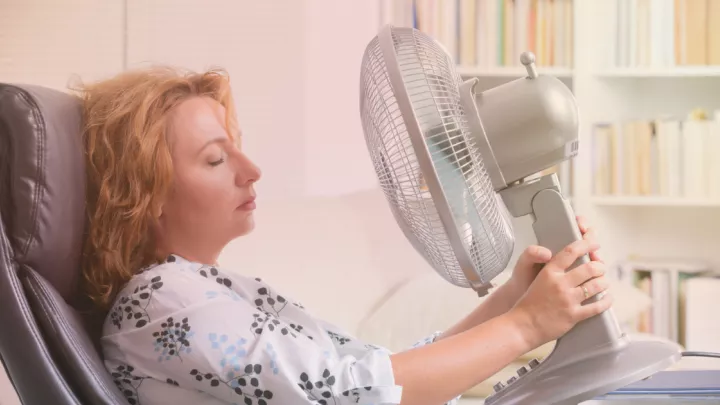What are perimenopause symptoms, and when can they start?

Perimenopause is a period of transition that varies widely from woman to woman. The premenopausal stage typically starts around age 45 with irregularities in your menstrual cycle. Periods become longer or heavier, and there may be spotting between cycles. You may also experience hot flashes and night sweats. Most women are menopausal (meaning it has been one year since the final menstrual period) around age 51.
Perimenopausal symptoms are caused by hormonal fluctuations. “It is kind of like puberty in reverse,” explains Morgan Steffen, DO, OB-GYN resident. “The most prominent change in hormones is a decrease in estrogen, which occurs when the body no longer ovulates (releases eggs from the ovary).”
Symptoms can last for years after the final menstrual period. “It is a very individual experience, and the presence and duration of symptoms is unpredictable,” says Dr. Steffen. “Symptoms can fluctuate and evolve as the body adjusts to the lower levels of estrogen and testosterone.” Later perimenopausal symptoms include:
- Joint aches.
- Genitourinary symptoms like vulvar burning and itching.
- More frequent urinary tract infections.
- Pain and dryness with intercourse.
- Decreased libido.
- Brain fog.
- Sleep disturbances.
- Depression.
Your risk for other medical conditions rises after menopause. These include:
- Decreased bone density and increased risk of osteoporosis.
- Loss of muscle mass and increased weight gain.
- Increased cardiovascular risks.
- Increased risk of Type 2 diabetes.
“Menopause is inevitable, and for many women, it can be uncomfortable,” says Dr. Steffen. “But this discomfort is treatable. If symptoms are affecting your quality of life, talk to your doctor to find out if you are a good candidate for hormone therapy.” The goal is to supplement with the lowest dose possible for the shortest timeframe to relieve symptoms while attempting to minimize the risk for other health concerns, like blood clots.
“Even if you are not bothered by perimenopausal symptoms, menopause and aging put women at risk for other medical conditions. It is important to regularly receive screening exams and attend preventive care visits,” Dr. Steffen says.
Call 800.922.0000 to schedule an appointment with one of our gynecologists.







